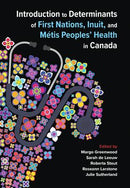Description
This critical new volume to the field of health studies offers an introductory overview of the determinants of health for Indigenous Peoples in Canada, while cultivating an understanding of the presence of coloniality in health care and how it determines First Nations, Inuit, and Métis peoples’ health and well-being.
The text is broken down into the What, Where, Who, and How, and each part contains a comprehensive and holistic approach to understanding the many factors, historical and contemporary, that are significant in shaping the life and health of Indigenous Peoples in Canada and beyond. Comprising wisdoms from First Nations, Inuit, and Métis leaders, knowledge holders, artists, activists, clinicians, health researchers, students, and youth, this book offers practical insights and applied knowledge about combating coloniality and transforming health care systems in Canada.
Compiled by experienced editors associated with the National Collaborating Centre for Indigenous Health, Introduction to Determinants of First Nations, Inuit, and Métis Peoples’ Health in Canada draws together the work and writings of primarily Indigenous authors, including academics, community leaders, and health care practitioners. This accessible and timely introduction is a vital undergraduate resource, and invaluable for introducing key concepts and ideas to students new to the field.
Contents
Dedication
Poetic Foreword, by Rita Bouvier
Self-Care and Emotional Trigger Warning
Introduction Indigenous Health in Canada and Beyond—A Call for Reflection, Action, and Transformation, by Sarah de Leeuw, Roberta Stout, Roseann Larstone, Julie Sutherland, and Margo Greenwood
Part I: Determinants of Health for Indigenous People
Chapter 1: Reflections on Love and Learning with the Yintah, by We’es Tes, Sandra Martin Harris and Christine Añonuevo
Chapter 2: First Nations, Inuit, and Métis Children’s Mental Wellness, by Margo Greenwood and Roseann Larstone
Chapter 3: Food as Relationship: Indigenous Food Systems and Well-Being, by Tabitha Robin
Chapter 4: Forced Sterilization: A Malicious Determinant of Health, by Yvonne Boyer and Rod Leggett
Chapter 5: Matriarchal Wisdom: Indigenous Women’s and Perinatal Health, by Jennifer Leason and Julie Sutherland
Chapter 6: A Reflective Poetic Narrative About a Fine Balance: Indigenous Women’s and Gender Diverse People’s Sexual and Reproductive Health, by Cassandra Felske-Durksen with Lisa Boivin
Part I Creative Contribution: Treaty Letter, by Armand Garnet Ruffo
Part II: Geographies and Ecologies of Indigenous Land, Health, and Philosophy
Chapter 7: Waskítaskamik: On the Face of the Earth, by Madeleine Kétéskwēw Dion Stout and Miyawata Dion Stout
Chapter 8: Damaged, Not Broken: An Interview about White Settler Violence and Indigenous Health, by Mary Teegee and Sarah de Leeuw
Chapter 9: Our Highways, Our Tears: Indigenous Women’s and Two Spirit People’s Health and Resource Extraction, by Ryan O’Toole, Onyx Sloan Morgan, and Laura McNab-Coombs
Chapter 10: Legislation, Reconciliation, and Water: Moving Upstream to Implement the UNDRIP in BC and Promote Indigenous Peoples’ Health, by Danièle Behn Smith and Shannon Waters
Chapter 11: Inuktut as a Public Health Issue, by Aluki Kotierk
Part II Creative Contribution: Cactus and Wild Roses, by Garry Gottfriedson
Part III: Supporting Healthy Indigenous Communities
Chapter 12: Vaccine Mistrust: A Legacy of Colonialism, by Margo Greenwood and Noni MacDonald
Chapter 13: Taking Care: Indigenous Peoples’ Art, Resurgence, and Wellness, by Jaimie Isaac
Chapter 14: A Path in the Snow: How Indigenous Medical Trainees Can Inspire Indigenous Youth to Become Medical Doctors, by Thomsen D’Hont
Chapter 15: Youth Protection, Social Determinants of Health, and Reappropriation of Decision-Making Power: Quebec First Nations Demands, by Marjolaine Siouï, Patricia Montambault, Michel Deschênes, Marie-Pier Paul, Leila Ben Messaoud, and Richard Gray (First Nations of Quebec and Labrador Health and Social Services Commission)
Part III Creative Contribution: Angled Windows, by Lee Maracle
Part IV: Practical Applications
Chapter 16: Transforming Medical Education, by Lisa Richardson and Julie Sutherland
Chapter 17: Learning from the Elders: Traditional Knowledge and Cultural Safety within Health Science Education, by Donna L. M. Kurtz and Elder Jessie Nyberg
Chapter 18: Indigenous Food Sovereignty: Realizing its Potential for Indigenous Decolonization, Self-Determination, and Community Health, by Charlotte Coté
Chapter 19: Walking with Our Most Sacred: Indigenous Birth Workers Clearing the Path for Returning Birthing to Indigenous Communities, by Jaime Cidro, Ashley Hayward, Rachel Bach, and Stephanie Sinclair
Chapter 20: Systems Innovation through First Nations Self-Determination, by Harmony Johnson, Danièle Behn Smith, and Lindsay Beck
Part IV Creative Contribution: ᐃᑦᑖᑐᖅ (to sit down for a long time), by Norma Dunning
Glossary
Contributor Biographies


